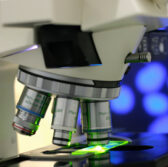 The Defense Advanced Research Projects Agency has awarded $980,000 in funds to Virginia-based Ceres Nanosciences to assess methods for the detection of immune system markers with the use of the company’s sample processing technology.
The Defense Advanced Research Projects Agency has awarded $980,000 in funds to Virginia-based Ceres Nanosciences to assess methods for the detection of immune system markers with the use of the company’s sample processing technology.
Ceres will work with Tufts University and George Mason University to adapt the Nanotrap sample processing technology for the capture of immune system markers on the Quanterix Simoa platform, Prince William County’s economic development agency said Wednesday.
The team will analyze immune marker detection across non-invasive biofluid samples such as venous blood, urine, saliva and capillary blood, which it will collect from healthy volunteers over 12 months.
“The ability to use non-invasive sample types, like urine or saliva, to routinely detect the fluctuations of immune status biomarkers opens up new opportunities for critical health and wellness monitoring applications,” said Ben Lepene, chief operating officer and director of research and development at Ceres.
Nanotrap was developed under funding from the National Institutes of Health and works to process various biofluid sample types for diagnostic applications.




